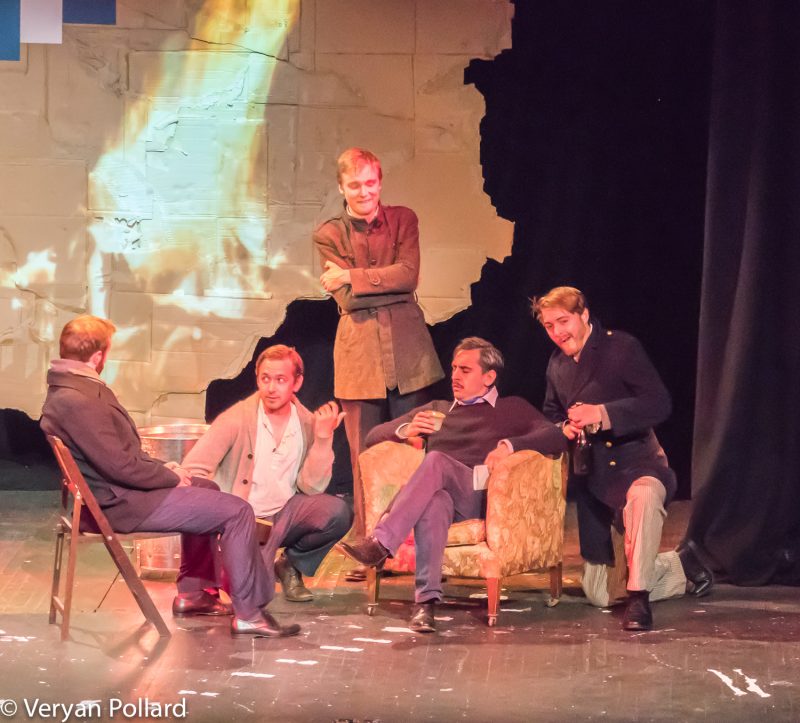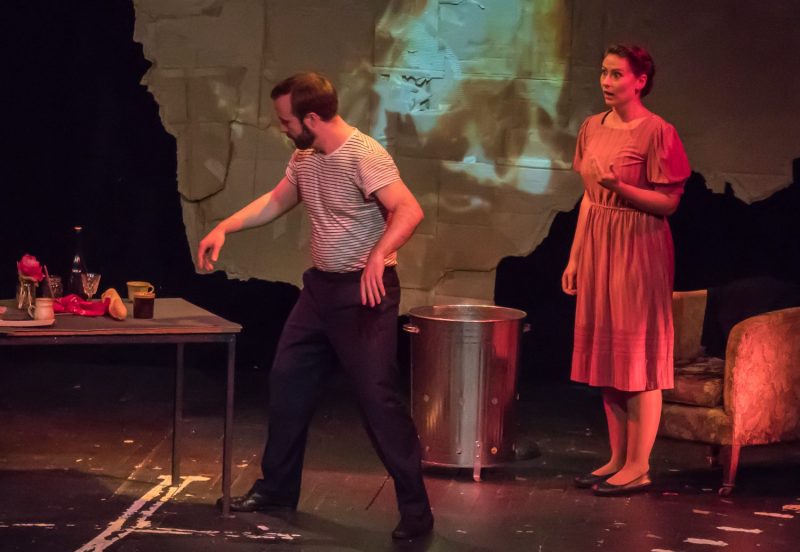First a confession: I adore La Boheme; pretty much everyone does too, and a performance like the one we heard at the Milligan Theatre on September 23 simply makes that adoration stronger. As in past years, Alisdair Kitchen presented a great and familiar opera in such a way as to make its inexhaustibility still clearer. The new vision of the Bohemian life given to us was achieved by setting the opera in 1943 wartime Vichy Paris.
This allowed the production to be set in front of a large outline map of France on which were projected contemporary newsreels reflecting, or on occasion, contrasting with, the action. It also suggested that the fate of civilisation itself was in danger because the four young Frenchmen with whom the work concerns itself are a cross section of that civilisation: Rodolfo (Richard Shaffrey) is a writer and poet, Marcello (Jerome Knox) is a painter, Colline (Timothy Edlin) is a philosopher and Schaunard (Alistair Sutherland) is a musician.
Making them members of the Resistance, manning barricades, suggests that their struggles against their country’s occupiers and Vichy are just as vital as their battle with hunger and the cold. The alteration of the Café Momus to the Momus Cinema further gives strength to the shift to the mid-twentieth century and also parallels the newsreel footage shown to the audience. The closing of the opera just before the Allied relief of Paris also gives rise to a powerful irony unavailable to a conventional interpretation: Mimi dies just as Paris is reborn.

This novel view of the opera was made completely convincing by a wonderfully talented young cast who sang and acted with immense expressiveness and carefully considered appropriateness. It may no longer be permissible to say this, but one of the clearest contrasts with which this opera abounds is that between the virility and manliness of Rodolfo and the femininity and sensitivity of Mimi, and Richard Shaffrey and Rannveig Karodottir perfectly combined to make this the human centre of the action. As significant, in another dramatic element, was the way in which Louise Fuller’s seductive but finally compassionate Musetta and Jerome Knox’s admirably realistic Marcello contrast their kind of love with that of the main characters. A third contrast is provided by the much older Benoit and Alcindoro, who were given both given convincing life by Conall O’Neill.
Altogether, this was a powerfully affecting and original production with boisterous camaraderie, great good humour, immense tenderness and deep emotion conveyed with artistry and conviction. It was reliably reported that in the most emotionally charged scenes of all, such as that between Rodolfo and Mimi at the end of the third act, unashamed snivelling could be heard in many parts of the auditorium, especially that in which I was sitting. Congratulations go to everyone involved in this inspiring enterprise, not forgetting the heroic Jonathan Musgrave, a pianist who made us forget that Puccini envisaged an orchestra for the most performed operatic work ever. It’s hard to believe that, after its premiere, a Turin newspaper wrote that La Boheme would ‘leave no great trace on the history of opera.’ What will Alisdair Kitchen and Euphonia present us with next? We have to wait, reluctantly, and see.
Photos: Rye and District Camera Club




Speaking as one of the unashamed snivellers from this performance of La Bohème, I can vouch for the fact that Alisdair Kitchen and Euphonia Studio produced the most remarkable rabbit-out-of-the-hat feat: pared to the minimum in terms of props and staging effects, the emotional impact and bathos of the story were propelled across to the audience with a mixture of superb singing and compelling acting.
Wonderful piano playing supported the production; and the outcome was something of a miracle, transcending the school hall surroundings completely
As the Festival draws to a close, I would like to congratulate everyone who has made it so successful.
In particular, many thanks to Peter Brice on his last Festival and to Bumble who has managed to keep all the artists very well fed and watered. A lot of hard work and many brilliant musical events to remember. To bring Tenebrae to St Mary’s Rye last Friday evening was inspirational and a joy to hear.
A very happy retirement Peter and thanks again for all you have done for the music part of the Festival over the years.
‘Twas a brilliant evening indeed and a very well written review. This is the 4th Euphonia production I’ve been to and they always engage and amaze … Well done Rye Festival.